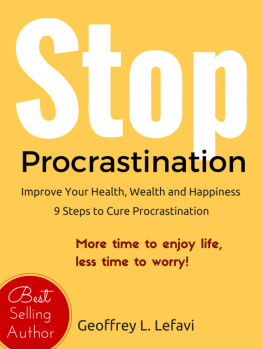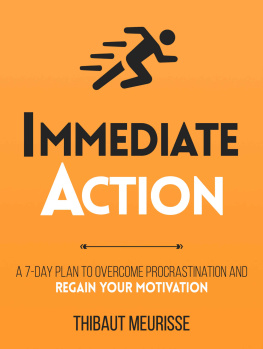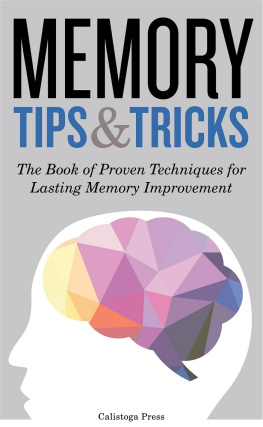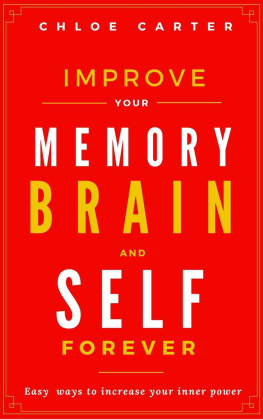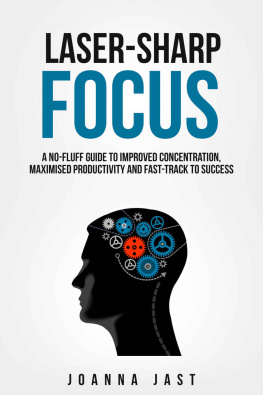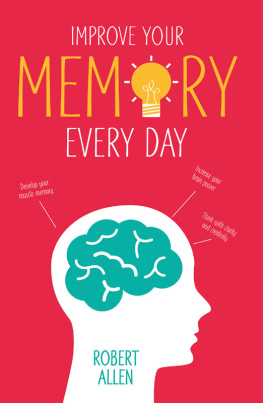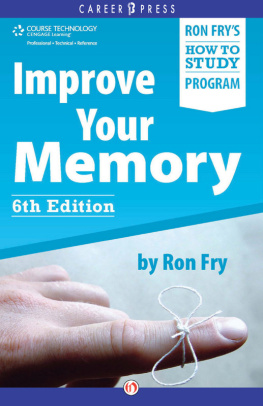Castillo - Brain Power: A Practical Guide to Improve Memory, Avoid Distractions and Fight Procrastination
Here you can read online Castillo - Brain Power: A Practical Guide to Improve Memory, Avoid Distractions and Fight Procrastination full text of the book (entire story) in english for free. Download pdf and epub, get meaning, cover and reviews about this ebook. year: 2016, publisher: Eddie Castillo, genre: Romance novel. Description of the work, (preface) as well as reviews are available. Best literature library LitArk.com created for fans of good reading and offers a wide selection of genres:
Romance novel
Science fiction
Adventure
Detective
Science
History
Home and family
Prose
Art
Politics
Computer
Non-fiction
Religion
Business
Children
Humor
Choose a favorite category and find really read worthwhile books. Enjoy immersion in the world of imagination, feel the emotions of the characters or learn something new for yourself, make an fascinating discovery.

- Book:Brain Power: A Practical Guide to Improve Memory, Avoid Distractions and Fight Procrastination
- Author:
- Publisher:Eddie Castillo
- Genre:
- Year:2016
- Rating:3 / 5
- Favourites:Add to favourites
- Your mark:
- 60
- 1
- 2
- 3
- 4
- 5
Brain Power: A Practical Guide to Improve Memory, Avoid Distractions and Fight Procrastination: summary, description and annotation
We offer to read an annotation, description, summary or preface (depends on what the author of the book "Brain Power: A Practical Guide to Improve Memory, Avoid Distractions and Fight Procrastination" wrote himself). If you haven't found the necessary information about the book — write in the comments, we will try to find it.
Castillo: author's other books
Who wrote Brain Power: A Practical Guide to Improve Memory, Avoid Distractions and Fight Procrastination? Find out the surname, the name of the author of the book and a list of all author's works by series.
Brain Power: A Practical Guide to Improve Memory, Avoid Distractions and Fight Procrastination — read online for free the complete book (whole text) full work
Below is the text of the book, divided by pages. System saving the place of the last page read, allows you to conveniently read the book "Brain Power: A Practical Guide to Improve Memory, Avoid Distractions and Fight Procrastination" online for free, without having to search again every time where you left off. Put a bookmark, and you can go to the page where you finished reading at any time.
Font size:
Interval:
Bookmark:
Brain Power
A Practical Guide to Improve Memory, Avoid Distractions and Fight Procrastination
Introduction
I want to thank you and congratulate you for downloading the book, Brain Power.
This book contains proven steps and strategies on how to to Improve Memory, Avoid Distractions and Fight Procrastination.
Many believe that its impossible to increase brain power, that if one is born ignorant, he or she will die that way. Another thing is to assume that mental decline is a normal part of old age. However, scientific research opposes these views and other brain myths. Not only can one increase his or her intelligence, but it is also possible to slow down mental decline in the senior years.
And to do that, all you need are the right strategies.
In this book, you will learn what it takes to increase brain power as well as concentrationno strenuous effort required or any sort of investment.
In our journey, we will cover ways of dealing with procrastination and distractions. We will also look at the lifestyle changes you need to make, neurobics, and a lot of other topics on how to improve brain power. You will surely find the book helpful.
Enjoy the reading!
Thanks again for downloading this book, I hope you enjoy it!
Copyright 2016 by Eddie Castillo - All rights reserved.
This document is geared towards providing exact and reliable information in regards to the topic and issue covered. The publication is sold with the idea that the publisher is not required to render accounting, officially permitted, or otherwise, qualified services. If advice is necessary, legal or professional, a practiced individual in the profession should be ordered.
- From a Declaration of Principles which was accepted and approved equally by a Committee of the American Bar Association and a Committee of Publishers and Associations.
In no way is it legal to reproduce, duplicate, or transmit any part of this document in either electronic means or in printed format. Recording of this publication is strictly prohibited and any storage of this document is not allowed unless with written permission from the publisher. All rights reserved.
The information provided herein is stated to be truthful and consistent, in that any liability, in terms of inattention or otherwise, by any usage or abuse of any policies, processes, or directions contained within is the solitary and utter responsibility of the recipient reader. Under no circumstances will any legal responsibility or blame be held against the publisher for any reparation, damages, or monetary loss due to the information herein, either directly or indirectly.
Respective authors own all copyrights not held by the publisher.
The information herein is offered for informational purposes solely, and is universal as so. The presentation of the information is without contract or any type of guarantee assurance.
The trademarks that are used are without any consent, and the publication of the trademark is without permission or backing by the trademark owner. All trademarks and brands within this book are for clarifying purposes only and are the owned by the owners themselves, not affiliated with this document.
Chapter 1: Fight Procrastination
Procrastinating is a sure-fire way to make your goals unaccomplishable, but to fight it, you must first understand why you do it. For many, the reasons include fear of failure, lack of the necessary skills, lack of motivation, fatigue, and boring work. Eventually, this leads to stress, poor quality work, and working for long hours.
But we must not look at procrastination as an all-out evil. In some situations, it can work for us; for example, when you put off an important decision, you make time to think about it exhaustively. And this prevents mistakes.
Likewise, late apologies are usually better as they give both parties time to think. And shelving a difficult task allows the brain to unconsciously work on solutions.
The deliberate act of putting off something is called active procrastination. And as you have seen, it can be beneficial. However, you must ensure that you have ample time before the deadline to avoid unnecessary pressure.
The other type is called passive procrastinationthe one you do without any specific reasons. Instead of finishing the report, you get on Facebook or Twitter. Instead of studying, you sit and watch TV until our eyes ache with sleep.
This is the type of procrastination you must deal with.
In a study that sought discover how to deal with procrastination, scientists divided 96 students into two groups. The control group had 47 students while the treatment group, which was taught time management intervention skills, had 49.
At the end, the treatment group showed no signs of procrastination. On the other hand, students from the control group were found to focus on their tasks as they got closer to the deadline. As you would expect, this led to stress and poor work.
Clearly, good time management skills are essential in fighting procrastination. But using them exclusively can lead to problems. The fact is that although you always have 24 hours daily, you cannot use this time the same every day. On some days, you will be less energetic, you may get distracted, etc. If you focus on time, you will be successful on some days and fail on others. All it takes is a simple email to throw your whole schedule into chaos.
Instead of managing time, manage energy. Time can come into the equation later.
By doing this, you will work when most productive and rest when your energy level drops, which is also the time you are most likely to procrastinate. During the rests, you can recharge for the next task.
You must stop looking at work like it is a marathon. Rather, see it as a series of sprints.
To be successful at this, here are some things you must keep in mind:
Make goals : these motivate as they show your destination and when you must be there. However, only the right goals can do this.
Firstly, you must ensure that your goal is specific; for example, I will write and finish a 2000-word report by 12 noon is better than I will write a report. Secondly, your goal must be achievable. Or else, deep in your brain, you will have a doubt that will weaken your courage to succeed.
If your goal is big, break it up. This will make it easy to achieve it and your confidence will also increase with each success.
Prioritize : you must know what to do first and last. So giving your tasks ratings of at least 1 to 3 will help. When you know you are most energetic, it's common knowledge to start with the most important tasks.
Make lists : crossing a task after you have completed it boosts motivation. (And motivation helps reduce procrastination.) In addition, by writing things down, you dont forget anything important and you declutter your mind.
Be flexible : each day is different, so dont expect to work the same way you did yesterday. You must learn to adapt, and if possible, make compromises as long as your achieve your goals.
Take breaks : these refresh your mind and help you stay focused when you start working. You must try to have a break of at least 5 minutes every 50 minutes. During this time, you can listen to a song, take a short walk, or look outside your window. Busy does not equal to effectiveness. So learn to work smarter, not harder.
Chapter 2: Dealing With Distractions
Closely linked to procrastination is distraction. In every direction we turn, there is something screaming for our attention. And if we give in, we hurt our productivity. Studies show that it takes an average of 21 minutes to refocus after a distraction.
Before we look at how to deal with this, you must first understand how concentration works. One thing to know is that although you can make a plan of how you will do something, you never know how you will do it until you start doing it. And this is what makes focusing complex:
Font size:
Interval:
Bookmark:
Similar books «Brain Power: A Practical Guide to Improve Memory, Avoid Distractions and Fight Procrastination»
Look at similar books to Brain Power: A Practical Guide to Improve Memory, Avoid Distractions and Fight Procrastination. We have selected literature similar in name and meaning in the hope of providing readers with more options to find new, interesting, not yet read works.
Discussion, reviews of the book Brain Power: A Practical Guide to Improve Memory, Avoid Distractions and Fight Procrastination and just readers' own opinions. Leave your comments, write what you think about the work, its meaning or the main characters. Specify what exactly you liked and what you didn't like, and why you think so.



